Looking for more information on becoming an Entrepreneur or running a successful startup? Well we are hosting monthly webinars to answer your burning questions. Entrepreneurs talk about their experience and will answer often asked questions. This journey that you are on is not an easy one, with many ups and downs, but it does not mean you have to do it alone. Our webinar series starts from the very beginning and walks you through the innovation process, finding funding, building a team and customer acquisition. So what are the benefits for you?
- Insights from Entrepreneurs who have been in your shoes before;
- Formulas, checklists and tips on how to be a successful entrepreneur;
- Opportunity to directly ask those burning questions.
Our knowledge transfer webinar series has already started but you can watch all previous episodes on our website or check out the summaries below. Also, mark your calendars for the upcoming webinars so you do not miss anything. More details below.
Summary of the Past Three Webinars
Entrepreneurs DNA
 Our first webinar is a great starting point for anyone considering becoming an entrepreneur, as it walks you through what it really takes to be a successful entrepreneur. The main takeaways answer the question, what are traits of an entrepreneur? These are not skills, nothing inherited, no expertise, no training …
Our first webinar is a great starting point for anyone considering becoming an entrepreneur, as it walks you through what it really takes to be a successful entrepreneur. The main takeaways answer the question, what are traits of an entrepreneur? These are not skills, nothing inherited, no expertise, no training …
- Fearless/ Risk Takers*
- Independent*
- Curious/ Open*
- Creative/ Compositive*
- Determined*
- Intelligent*
- Connected
- Communicative
- Confident
- Involving
*Must have to be a founders. Cofounders can offset 40% of the missing traits.
Idea Seeker
 You want to be an entrepreneur. You have the important traits addressed in our first webinar, Entrepreneurs DNA but you don’t have an idea? In our next webinar, Idea Seeker, we showed you where the best ideas in the world come from. You might be surprised; it is easier than you may think.
You want to be an entrepreneur. You have the important traits addressed in our first webinar, Entrepreneurs DNA but you don’t have an idea? In our next webinar, Idea Seeker, we showed you where the best ideas in the world come from. You might be surprised; it is easier than you may think.
Where are great ideas coming from?
- From your own experiences (problems)
- From careful market observation & listening
- From taking many perspectives (see opportunities)
- Crafting a concept (initial value of an idea is zero)
- Get ready to execute – the path to value and prosperity
- Why even looking for an idea? It’s the ignition.
Idea Validation
 Now you have your idea but how good is that idea really? Do you know? Our next webinar, Idea Validation, showed you how to get that answer and even how to make a so-so-idea into a really great idea. We cannot stress enough, build what customers want – not what you think they should get! Here is some top client feedback to consider:
Now you have your idea but how good is that idea really? Do you know? Our next webinar, Idea Validation, showed you how to get that answer and even how to make a so-so-idea into a really great idea. We cannot stress enough, build what customers want – not what you think they should get! Here is some top client feedback to consider:
- What problem would you solve?
- What value would it be? How much?
- What happens if we take it away?
Where to Watch
You can watch all of our Knowledge Transfer webinars, including are SPECIAL EDITION sessions here: http://wiforum.org/webinar-recordings/ If you enjoyed the content please let us know by commenting, subscribing or liking our videos on YouTube. We are welcome to any feedback and are happy to answer any additional questions you might have. Please email us at contact@wiforum.org.
Join our Next Session
We are hosting our next session, Innovative Thinking on Monday, August 3 at 10:00 AM WAT | 12:00 PM EAT | 4:00 PM ICT. Want to become really innovative with ground breaking concepts? You can actually learn this. Don’t miss out on anymore of our webinars, find all upcoming events and registration links here: http://wiforum.org/online-events/.
Yet another amazing World Innovations Forum Conference, all online. Attendees from 59 countries and speakers from 22 countries made it a great event.
The conference started with the 10-year agenda of the World Innovations Forum Foundation. Our Chairman talked about the time it takes to make startups into big companies and how many are needed to turn a developing country into a prosper economy. The aim of the forum and its members from over 20 countries is to double the number of developed countries by the end of this decade – 2030. Later on he spoke about the Innovations age where currently 30 patents are registered every minute. By inspiring more innovation this number will grow exponentially in the next ten years.
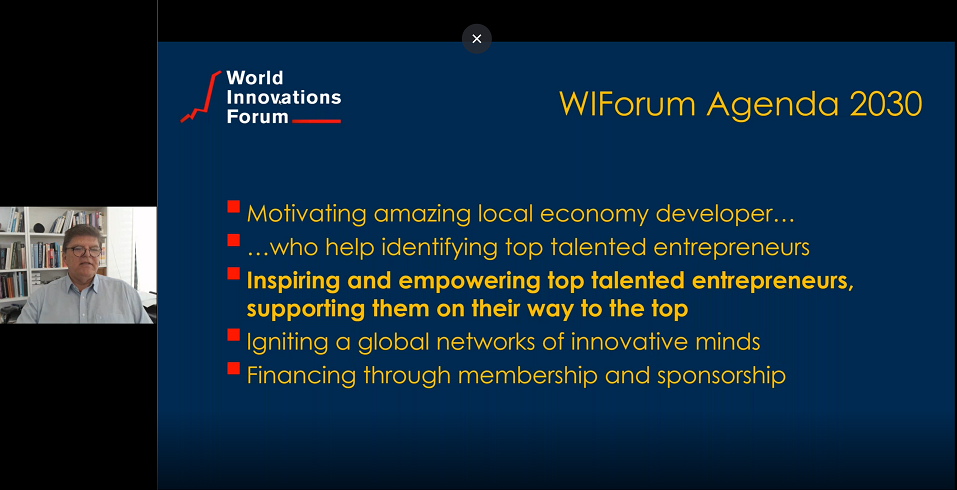
A WHOLE GROUP OF ORGANIZATIONS ALIGNED
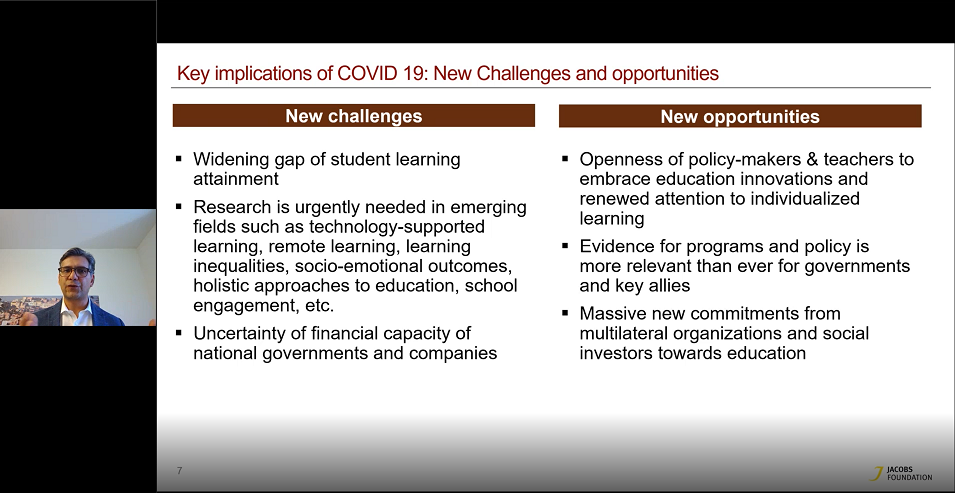 The World Innovations Forum is not the only organization with big ambitions. Another organization in our ecosystem are helping entrepreneurs to thrive, create large number of jobs and get their country to prosperity is the Jacobs Foundation. Their contribution to 2030 is to help with education and embracing learning variability. From a one fits all education system to learner adjusted education.
The World Innovations Forum is not the only organization with big ambitions. Another organization in our ecosystem are helping entrepreneurs to thrive, create large number of jobs and get their country to prosperity is the Jacobs Foundation. Their contribution to 2030 is to help with education and embracing learning variability. From a one fits all education system to learner adjusted education.
ENTREPRENEURSHIP DEVELOPMENT
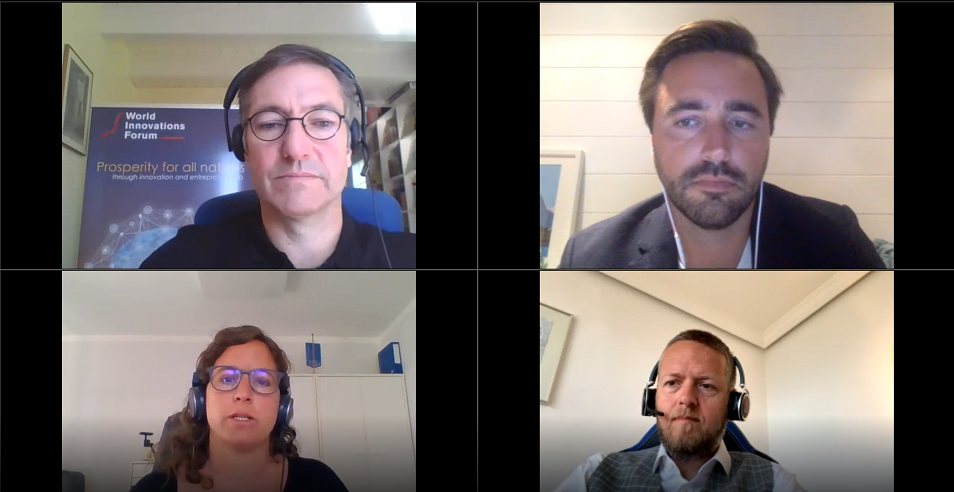 In the following entrepreneurs round table, representatives from Tech in Africa, Axel Peyrier, the Happel foundation, Alexander Lanz and SwissContact, Teresa Widmer spoke about what it takes to actually inspire entrepreneurs, not telling them what to do. Great discussions and a variety of perspectives.
In the following entrepreneurs round table, representatives from Tech in Africa, Axel Peyrier, the Happel foundation, Alexander Lanz and SwissContact, Teresa Widmer spoke about what it takes to actually inspire entrepreneurs, not telling them what to do. Great discussions and a variety of perspectives.
AMAZINGLY INNOVATIVE ENTREPRENEURS
We saw a total of 9 amazing startups and scaleups that only proves, that there are extraordinary and innovative startups in any country on Earth.
Owen Sakawa from RepairNet, Kenya, is building a platform for a roughly billion people market and their repair needs in Africa. And Eddy Richauvet from ShopRunBack in Cambodia is building possibly the most powerful addon to the e-commerce world, a complete “Return-Platform” including the logistics network for the 65% of the eCommerce market not covered by Amazon.
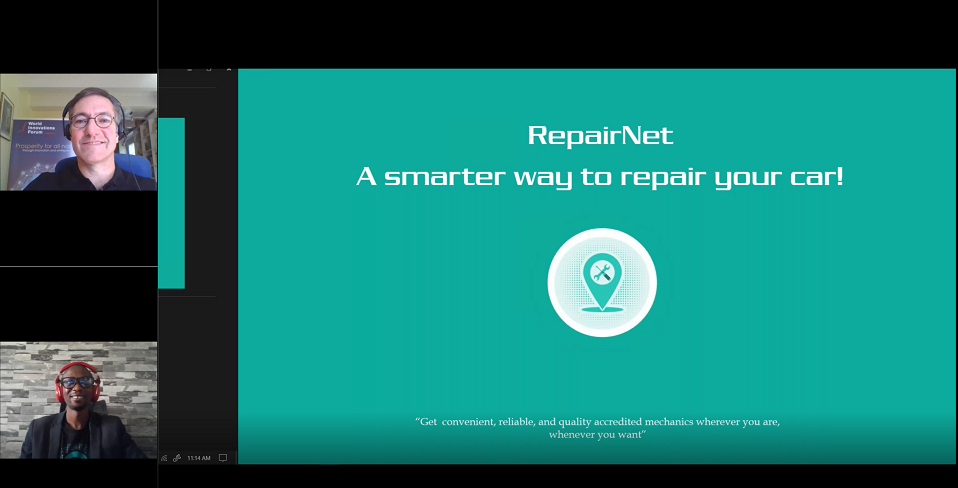
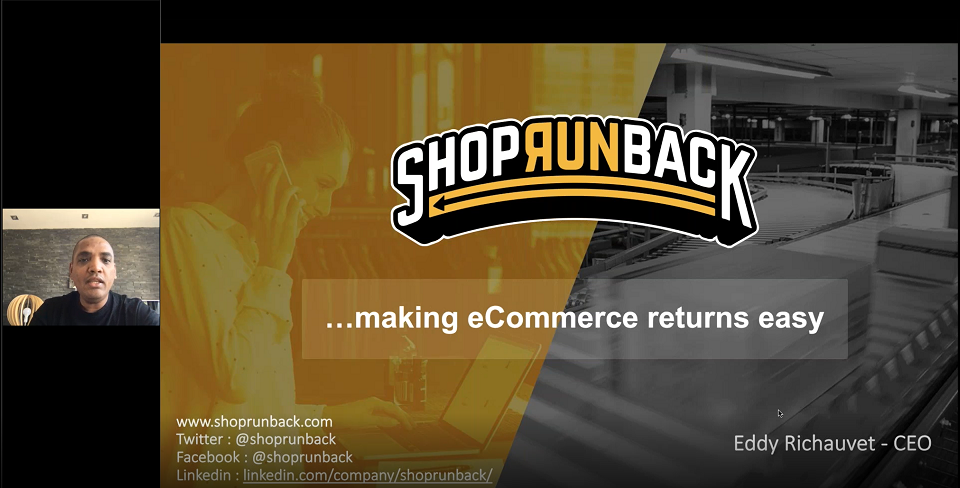
Lin Hwang from Damogo, Indonesia is fighting food waste and how they turned on the heat in just a few months. Tobias Gunzenhauser, from Yamo, another Accelerator graduate, shared how he and his co-founders built Yamo into a super fast growing baby-food powerhouse.
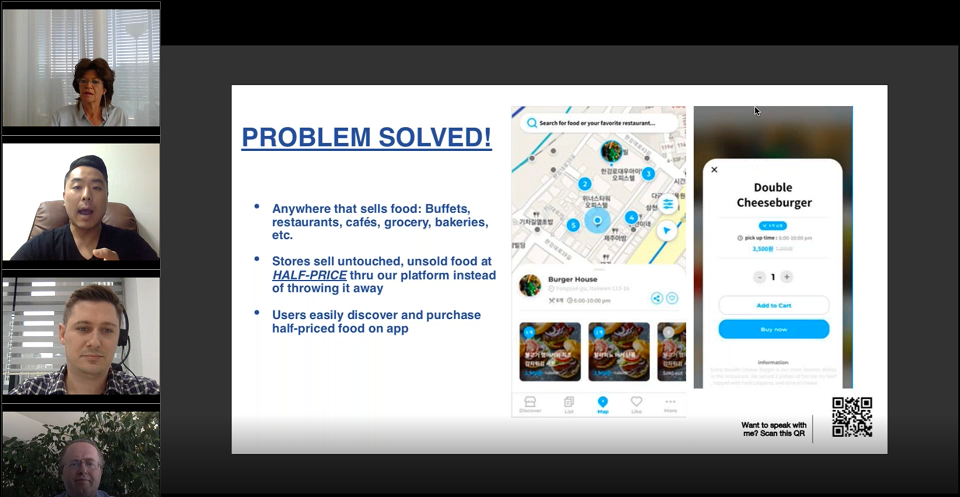
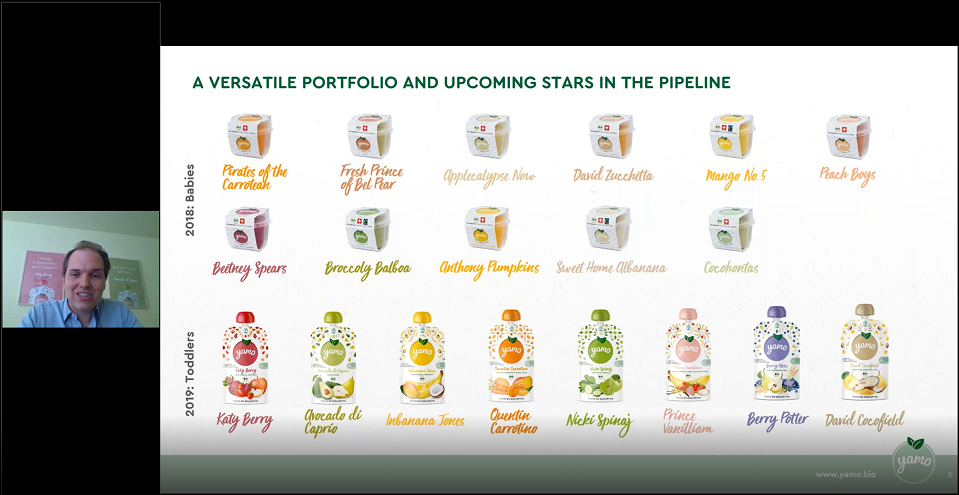
Agudor Agabas from AppCycle in Ghana presented their idea and how they transform waste to new products and use almost exclusively waste to produce everything from clothes to accessories in a very innovative way. A different innovator was Ibrahim Abdulmalik from Farmula in Kenya, he shared how they help revitalize the supply chain of farmers’ businesses, as it is to a large degree destroyed from western food business. Expired food from the developed nations are brought into Africa as “development aid” but ruins in some sections the entire local food chain. How can a chicken farmer compete with their free range chicken against chicken for free, even if it is already a bit rotten.
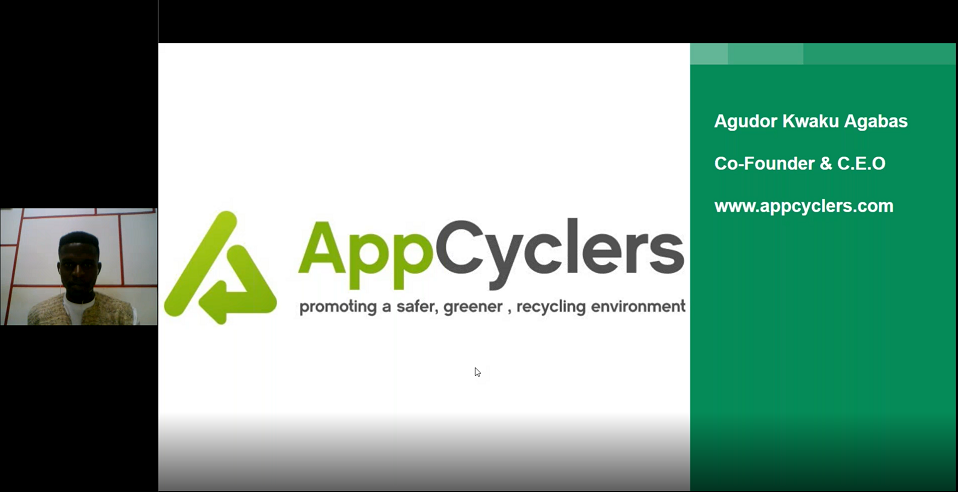
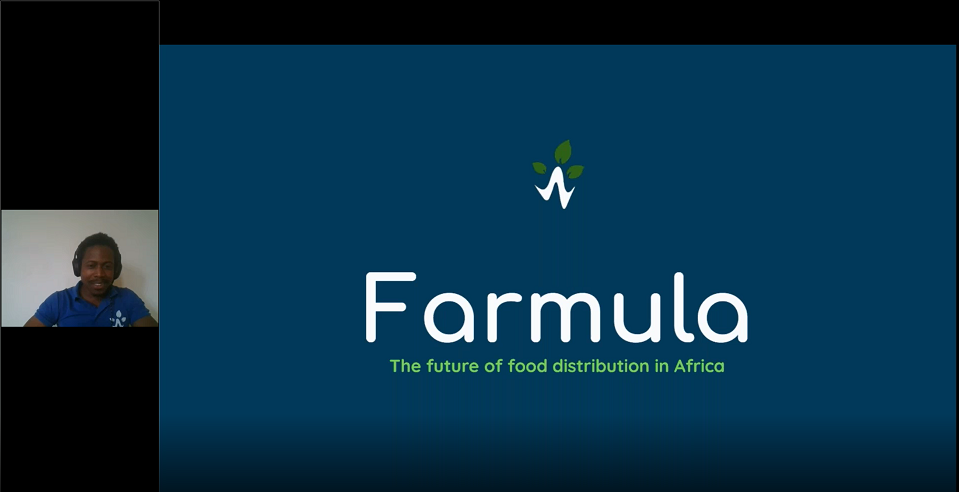
Moving virtually back to Asia, Phi Nguyen from sPhoton presented a new Artificial Intelligence based Corporate Communication System, taking modern voice interaction aka Alexa into the corporate world. It may not apply in the West, but the 6 billion Asian market with managers half the average age and hungry for digital experiences, is certainly a pristine market for it. Africa is seeking talents very much like Asia. Emmanuel Leslie, from TalentsInAfrica in Ghana presented another AI based solution for talent development and talent match. With a number of startups that exceed the number of Silicon Valley startups, Africa is moving extremely fast and talent acquisition is one of the limiting factors.
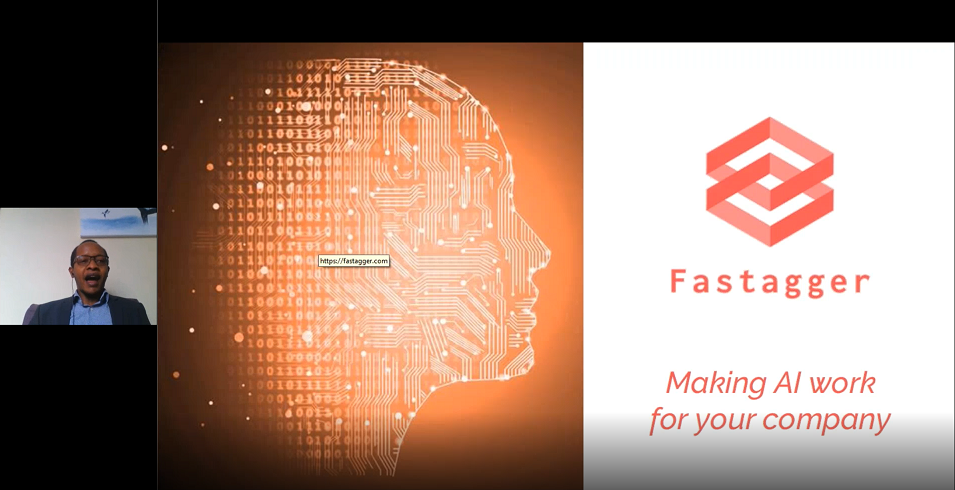
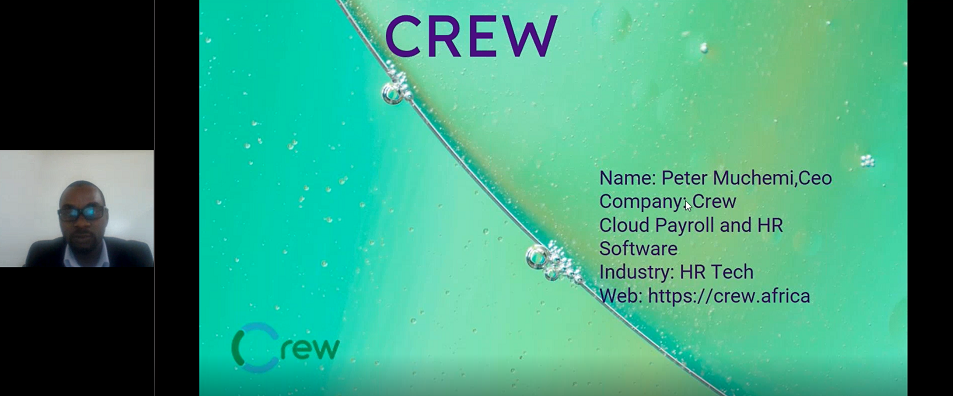
Two more innovators presented, Mutembei Kariuk from Fastagger in Kenya and Peter Muchemi from Megashift, also in Kenya. Last and definitely not least was a special highlight. Binay Raut, from Paaila in Nepal presented the first Artificial intelligence based Robot from Nepal. In less than a year, the team built a first greeting robot, then a more sophisticated robot for banks and was even able to export their robots to the US. During the pandemic, Paaila was the first to build a robot for hospitals, serving patience and reducing the risks for the care personnel. Just a few years ago, it was unthinkable to create AI based robots made in Nepal.
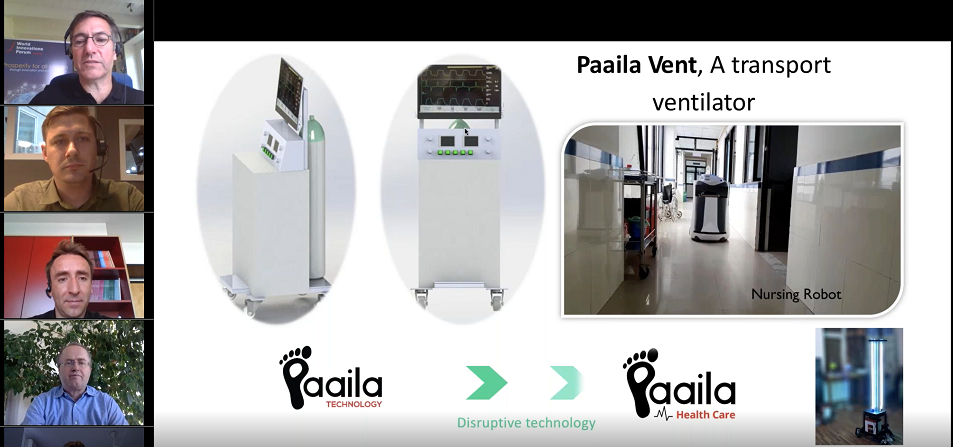
FINANCIAL COMPANY VALUATIONS
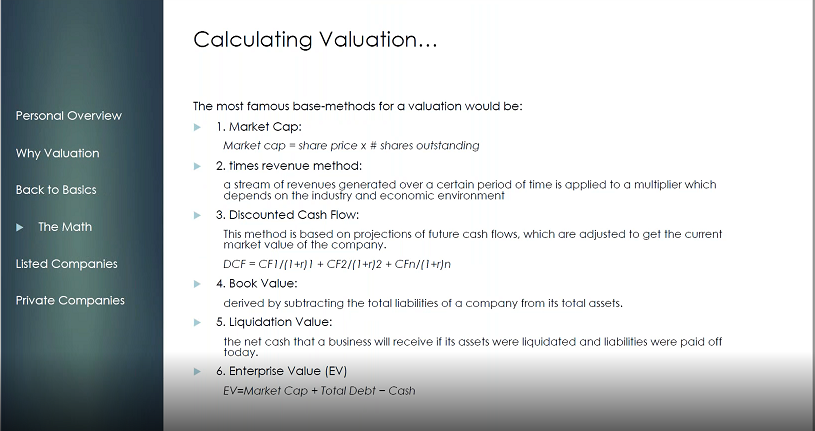 The most challenging finance question for startups is to create a meaningful and defensible company valuation. This challenge is the same, all over the planet. Karim Raffa, a finance expert, former entrepreneur and investor himself is educating startups to create valuations that attract investors but not ruining their capital. Karim is also helping investors to make meaningful offers, because asking for too much equity in the beginning may change the discussion quickly against both, investor and entrepreneur.
The most challenging finance question for startups is to create a meaningful and defensible company valuation. This challenge is the same, all over the planet. Karim Raffa, a finance expert, former entrepreneur and investor himself is educating startups to create valuations that attract investors but not ruining their capital. Karim is also helping investors to make meaningful offers, because asking for too much equity in the beginning may change the discussion quickly against both, investor and entrepreneur.
INVESTOR ROUND TABLE
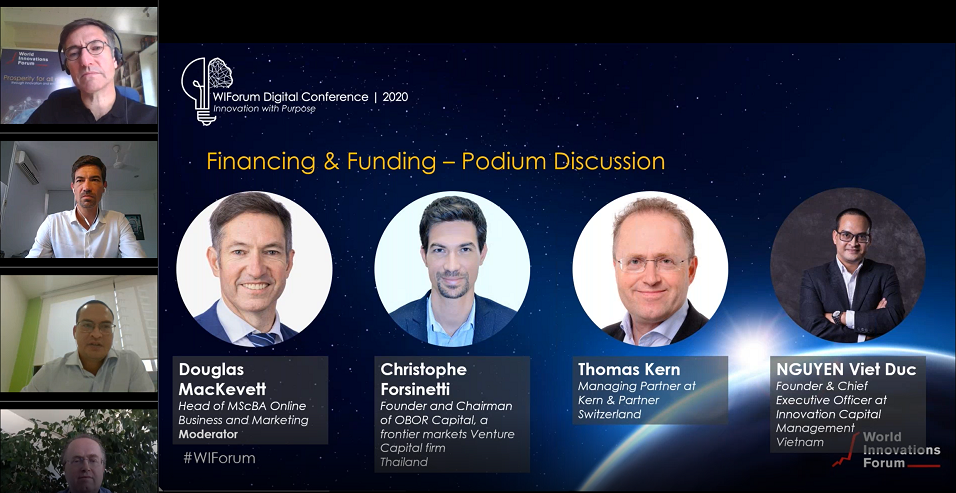 With investors from Cambodia [Christophe Forsinetti], Switzerland [Thomas Kern], and Vietnam [Duc Viet Nguyen], we had a great mix of representation from developing, fast emerging and developed nations. Investors from around the world look for gold nuggets. Average quality startups are nearing a million and have the highest risk. Lack of well structured FDI policies for equity foreign direct investments however still prohibit deep pocket investors to invest in these new countries. In Asia most startups move their HQs to Singapore and African companies to the UK, Singapore or Switzerland.
With investors from Cambodia [Christophe Forsinetti], Switzerland [Thomas Kern], and Vietnam [Duc Viet Nguyen], we had a great mix of representation from developing, fast emerging and developed nations. Investors from around the world look for gold nuggets. Average quality startups are nearing a million and have the highest risk. Lack of well structured FDI policies for equity foreign direct investments however still prohibit deep pocket investors to invest in these new countries. In Asia most startups move their HQs to Singapore and African companies to the UK, Singapore or Switzerland.
INNOVATION OF NATIONS
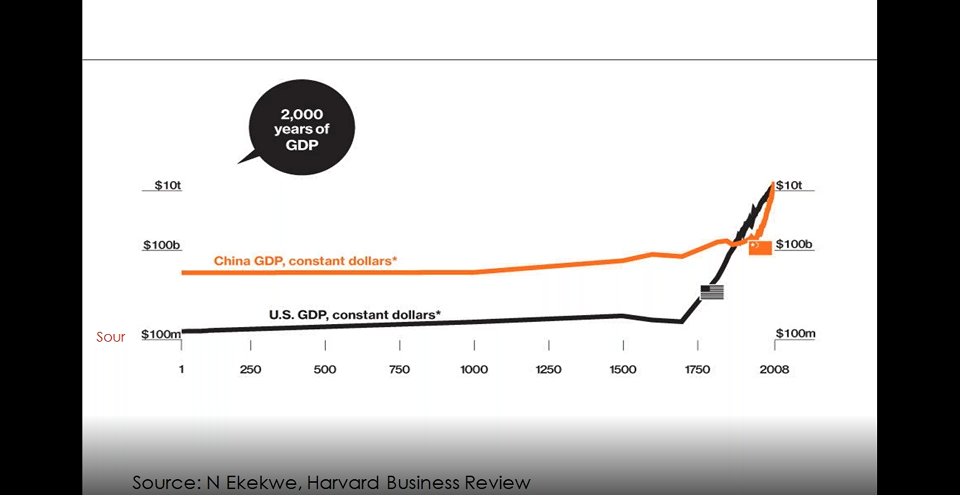
We heard an intellectually demanding but to the point speech from Ndubuisi Ekekwe, about the importance of innovation for each nation as a key to competitiveness and prosperity. He talked about how good policies can unleash the power of innovation or limit them, and what economic frameworks can do to empower entrepreneurship to thrive and create jobs or disable their abilities and make them possibly leave their countries. He essentially delivered the recipe for politicians to make their countries thrive.
DEVELOPMENT IN AFRICA
Emmanuel Ndonga spoke about the unique opportunities for Africa. Almost 60% of the African population is under the age of 25 with untapped opportunities for growth and development. But Africa is not a country with a culture, it is continent 54 sovereign countries and a total population of 1.3 Billion with a fast growing number of university graduates. Emmanuel presented an amazing list of activities for governments and the population to get up and get autonomous, reducing external influence and becoming innovative – because they can. Similarly a great presentation from Ashwin Ravichandran who spent many years in Africa, and helped hundreds of entrepreneurs build their businesses and thrive. Africa has changed dramatically in the past 10 years and the biggest shift is yet to come.
THE INFLUENCE OF EDUCATION
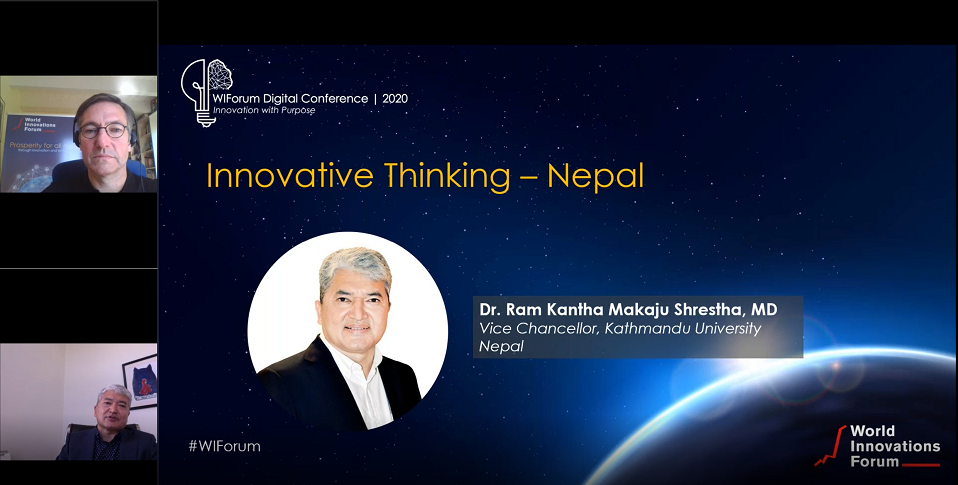 Education, in particular education for innovative thinking, like it is practices in Switzerland, was addressed by Dr. Ram Shrestha Ph.D., Vice Chancellor of the Kathmandu University. He gave insights into how and why Nepal should accelerate their motivation to more entrepreneurship in Nepal. Later on Dr. Matthes Fleck, Ph.D. from the University for Science and Arts in Lucerne spoke about the talent development of entrepreneurs from western universities and the importance for startups to get access to those talents early on.
Education, in particular education for innovative thinking, like it is practices in Switzerland, was addressed by Dr. Ram Shrestha Ph.D., Vice Chancellor of the Kathmandu University. He gave insights into how and why Nepal should accelerate their motivation to more entrepreneurship in Nepal. Later on Dr. Matthes Fleck, Ph.D. from the University for Science and Arts in Lucerne spoke about the talent development of entrepreneurs from western universities and the importance for startups to get access to those talents early on.
ENTREPRENEURSHIP GENDER NEUTRAL
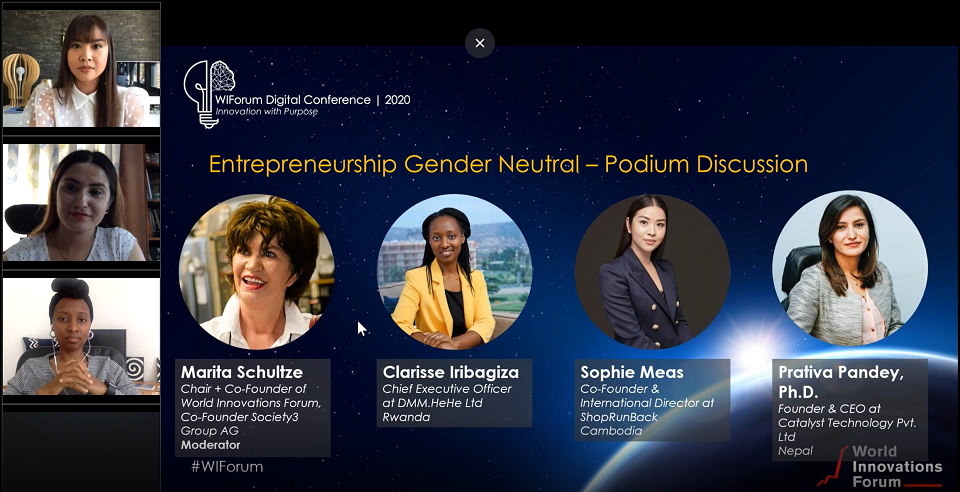 WIForum Chair and co-founder Marita Schultze organized a round table where female entrepreneurs including Clarisse Iribagiza from Rwanda, Sophie Meas from Cambodia and Prativa Pandey, Ph.D. from Nepal had a partly controversial discussion about the role women in entrepreneurship. In some countries it is not even a discussion about the gender sensitivity, yet in others societies, women are still discriminated in so many ways, like in Nepal, so that the entrepreneurship aspect is just a side effect.
WIForum Chair and co-founder Marita Schultze organized a round table where female entrepreneurs including Clarisse Iribagiza from Rwanda, Sophie Meas from Cambodia and Prativa Pandey, Ph.D. from Nepal had a partly controversial discussion about the role women in entrepreneurship. In some countries it is not even a discussion about the gender sensitivity, yet in others societies, women are still discriminated in so many ways, like in Nepal, so that the entrepreneurship aspect is just a side effect.
NEURO IDEATION
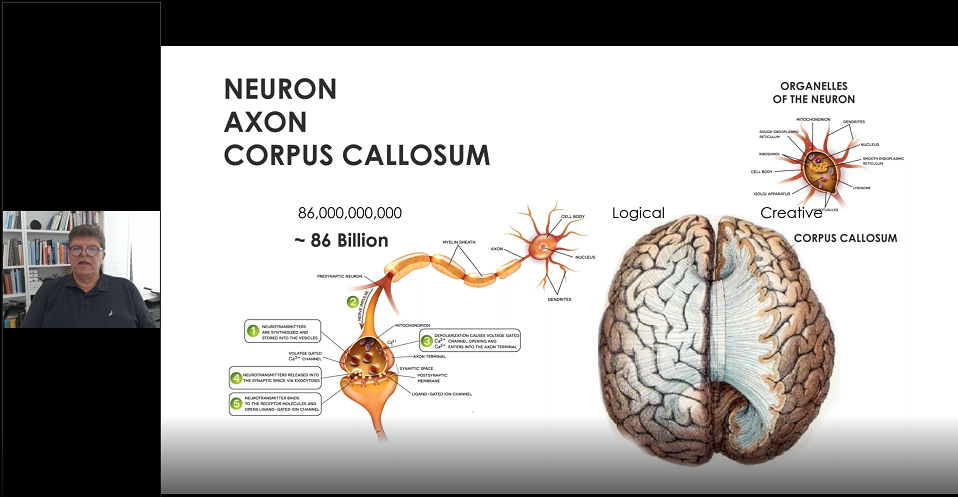 The most advanced technique to create innovative and disruptive ideas and turn them into reality is Neuro Ideation. Attendees learned how the brain actually composes ideas and how they are processed so that innovation can happen. The concept of Neuro Ideation is brand new and puts emerging countries and developed countries on a even playing level. Rapid idea development, accompanied by a disruptive business model can happen as quickly as 3 weeks but no longer than 6 months. The Deep Innovation Design method, with neuro ideation at its core fundamentally changes the act of innovation and disrupts innovation itself. The world Innovations Forum, together with the Society3 Group will be empowering entrepreneurs independent of which country they are from.
The most advanced technique to create innovative and disruptive ideas and turn them into reality is Neuro Ideation. Attendees learned how the brain actually composes ideas and how they are processed so that innovation can happen. The concept of Neuro Ideation is brand new and puts emerging countries and developed countries on a even playing level. Rapid idea development, accompanied by a disruptive business model can happen as quickly as 3 weeks but no longer than 6 months. The Deep Innovation Design method, with neuro ideation at its core fundamentally changes the act of innovation and disrupts innovation itself. The world Innovations Forum, together with the Society3 Group will be empowering entrepreneurs independent of which country they are from.
INNOVATION FIGHTING PANDEMICS
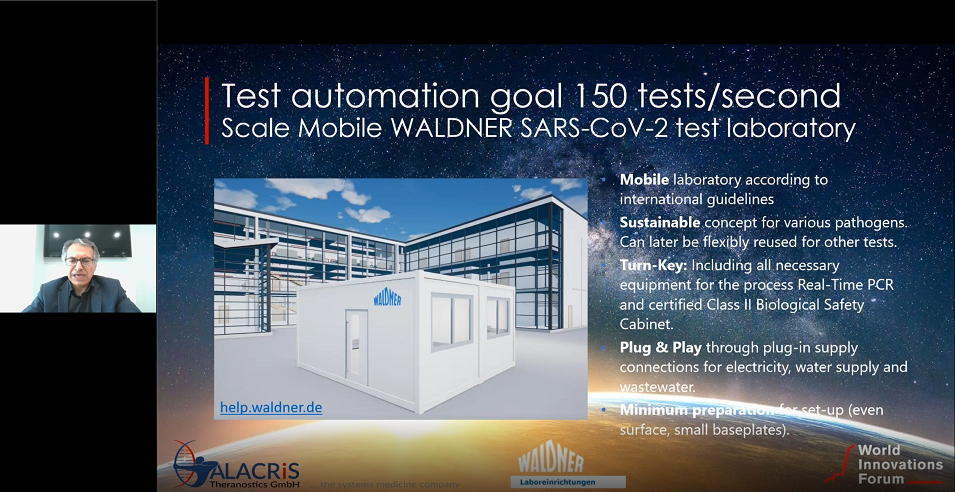 Another highly innovation related topic, that is very timely as well, was presented by Cafer Tosun, an SAP executive and Advisory Board Member to the WIForum. Innovation Fighting Pandemic, is an initiative, led by Cafer Tosun, leveraging the innovative spirit to fight covid-19. After a short but intense campaign to wear a mask, the campaign was reduced in intensity after 62 countries announced masks are mandatory or at least highly recommended. He shared some details about a new project where innovative thinking was applied in its truest sense. A concept to eradicate covid-19 neither by vaccines or treatment but by mass testing and stopping the transfer of the virus. The method and concept to do so came neither from the technology sector nor from the medical sector, but from the genetics space. There is a good chance to test millions of people per day and up to 5 billion in a week. We will be providing updates after the next tests in a few days.
Another highly innovation related topic, that is very timely as well, was presented by Cafer Tosun, an SAP executive and Advisory Board Member to the WIForum. Innovation Fighting Pandemic, is an initiative, led by Cafer Tosun, leveraging the innovative spirit to fight covid-19. After a short but intense campaign to wear a mask, the campaign was reduced in intensity after 62 countries announced masks are mandatory or at least highly recommended. He shared some details about a new project where innovative thinking was applied in its truest sense. A concept to eradicate covid-19 neither by vaccines or treatment but by mass testing and stopping the transfer of the virus. The method and concept to do so came neither from the technology sector nor from the medical sector, but from the genetics space. There is a good chance to test millions of people per day and up to 5 billion in a week. We will be providing updates after the next tests in a few days.
THE PEOPLE BEHIND THE VISION IN EACH COUNTRY
During the three days we also heard from our Country Ambassadors: Dung Trung Nguyen [Vietnam], Khem Lakai [Nepal], Christella Uwamahoro [Rwanda], Eunice Nyandat [Kenya] and MacCarthy Mac-Gbathy [Ghana]. With each of them we discussed what is attractive in their country for those seeking entrepreneurship opportunities, how fast they develop and what the possibilities are for foreigner who may help build their respecting nations. History has shown that there have been many “Lands of Opportunity” in the past: Egypt, Greece, Rome, the UK, the US to name just a few. All have been nearly world dominating – none have ever seen true world domination. Now, there are many different lands of opportunities popping up almost at the same time. Maybe it is the time humankind realizes that we can only reach our best potential when all other nations reach their best potential as well.
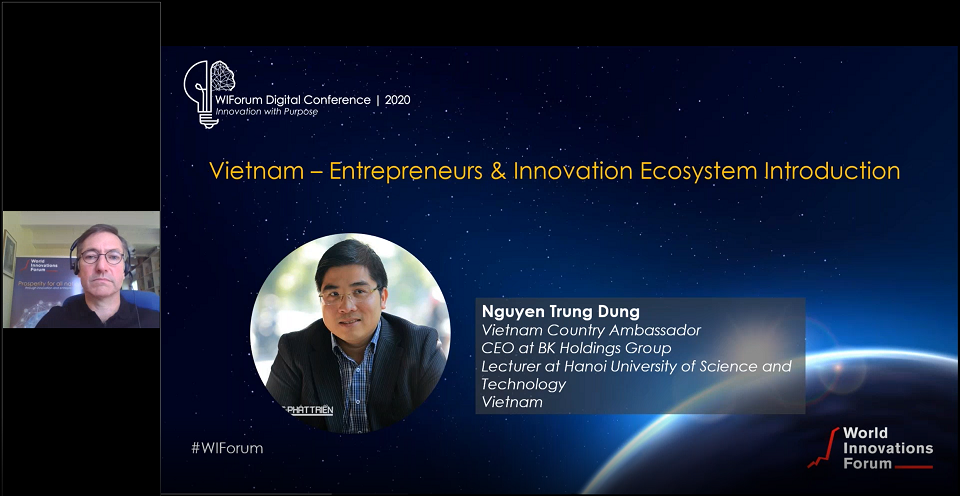
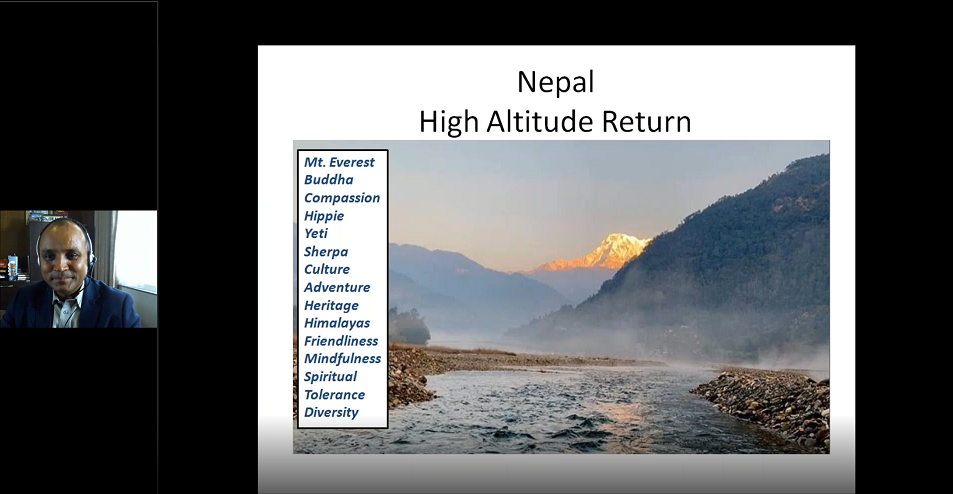
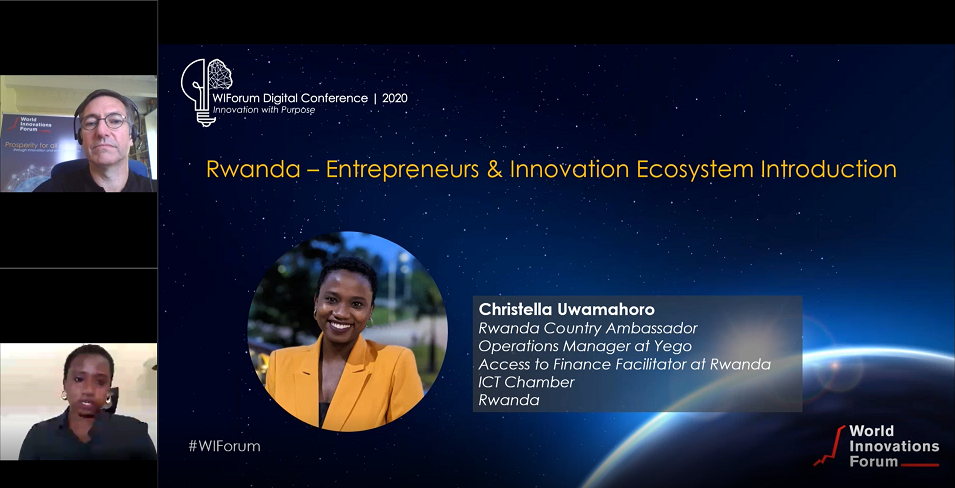
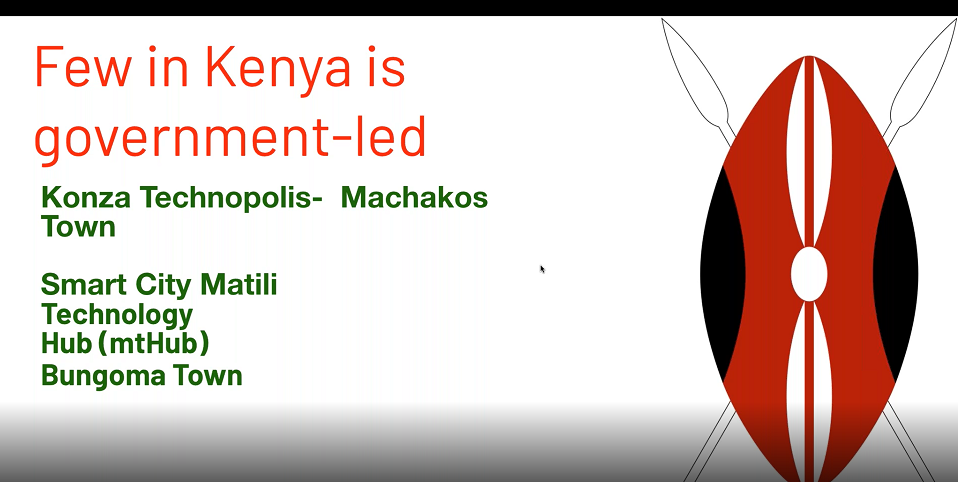
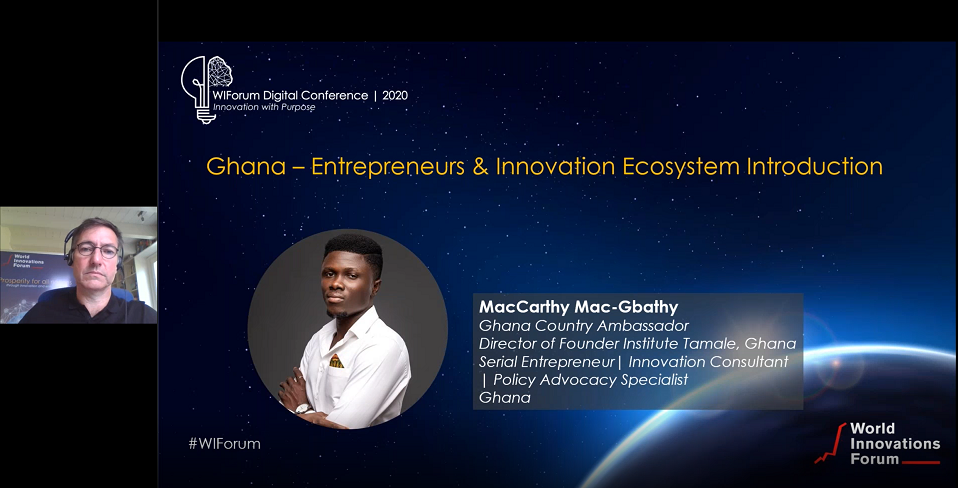
THE FUTURE OF NATIONS
It is no longer a futuristic vision, that emerging countries will become a significant contributor to our global economy. Well aware of what worked and what didn’t in the past, most entrepreneurs of the future are very well aware that companies with 100,000+ employees are most likely not the future of the global economy but highly agile specialists connecting and collaborating with each other. The makers movement in China has already proven that millions of people are producing a small number of unique components faster, better and less expensive than any other nation. The advantage is not the cheap labor as labor cost rises in Shenzhen very quickly as well – the advantage is an unparalleled agility. The other mega challenge is global energy consumption. As more and more emerging countries are rising, so is their energy hunger. Also here, ingenuity and unique entrepreneurs working on various energy related projects such as geothermal energy development in Kenya, where 40% of Kenya’s energy consumption is generated by that technology. Geothermal development in Ethiopia, Kenya, Tanzania, Uganda and Rwanda will provide much-needed environmentally sustainable energy, maybe one day for all of us. Similarly is the development in South East Asia rapidly moving towards better technology, far more automation than in any other area in the World. Singapore can be called the most advanced nation in the world with an unseen before balance between human development, nature protection, sustainable planning for the future and a nowhere else achieved lifestyle. The 4.4 Billion Asians plus 1.4 billion Africans represent not only by far the largest markets on earth but also the most agile development and most innovation hungry young generation. The biggest advantage of this 5.8 billion population (75% of all people) is their low level of protectionism, bureaucracy and innovation blocking interest groups.
By 2030 we can expect developed nations will be doubling and by 2040 doubling again, which means more than half of the nations are having a status of developed country.
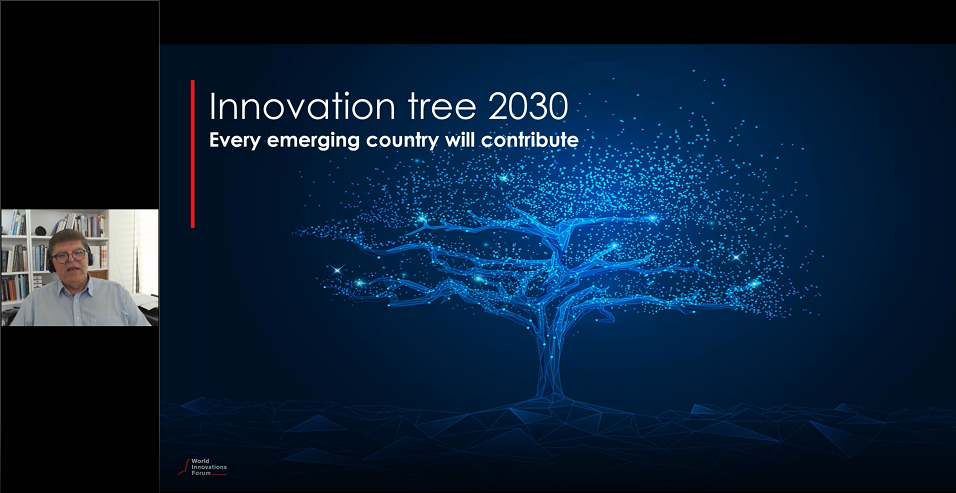
Axel Schultze, the World Innovations Forum chairman closes by saying “Even the world’s strongest nation will unfold it’s biggest potential, at the day every other country has reached theirs”.
The next World Innovations Forum Global Conference is scheduled to be held in June 2022.
The whole WIForum Team in Switzerland as well as all our national teams in the respective countries like to thank everybody for their amazing contribution and participation in this years event.
By Cafer Tosun, Alyssa King, Axel Schultze
Everyone from young to old, wants to know when this pandemic is going to be over. We need a plan to end Covid-19. There are many companies and researchers around the world working feverishly to find a cure. Some vaccines companies in various countries have started their clinical trial phases. It will be the fastest in history to enter the market for a vaccine. And yet there is no concrete plan when this will be. It might take one, two or more years. With KnockOut-19 we have started a campaign to end the Covid-19 pandemic in 19 weeks.
Campaign – KnockOut-19
Yes, in 19 weeks! In about 5 months this could be over. And it doesn’t take much. If everyone wore a mask. Covid-19 could be over, because there would be no host for the virus. With no host there will be no virus. It’s that simple. This is where we need you to support the campaign. The goal of the campaign is that we are faster in getting everyone to wear a mask than the virus can spread. We need you to join the campaign, wear a mask and ask your friends to do the same. If you get only 3 friends within a week to wear a mask, and your friends do the same, we could reach the entire world population of 7.8 Billion people in 19 weeks, based on pure math. And if everyone wears a mask it significantly reduces the probability of becoming infected with the coronavirus. The good thing is that this works even if it is a simple mask or a scarf, with which you cover your mouth and nose.
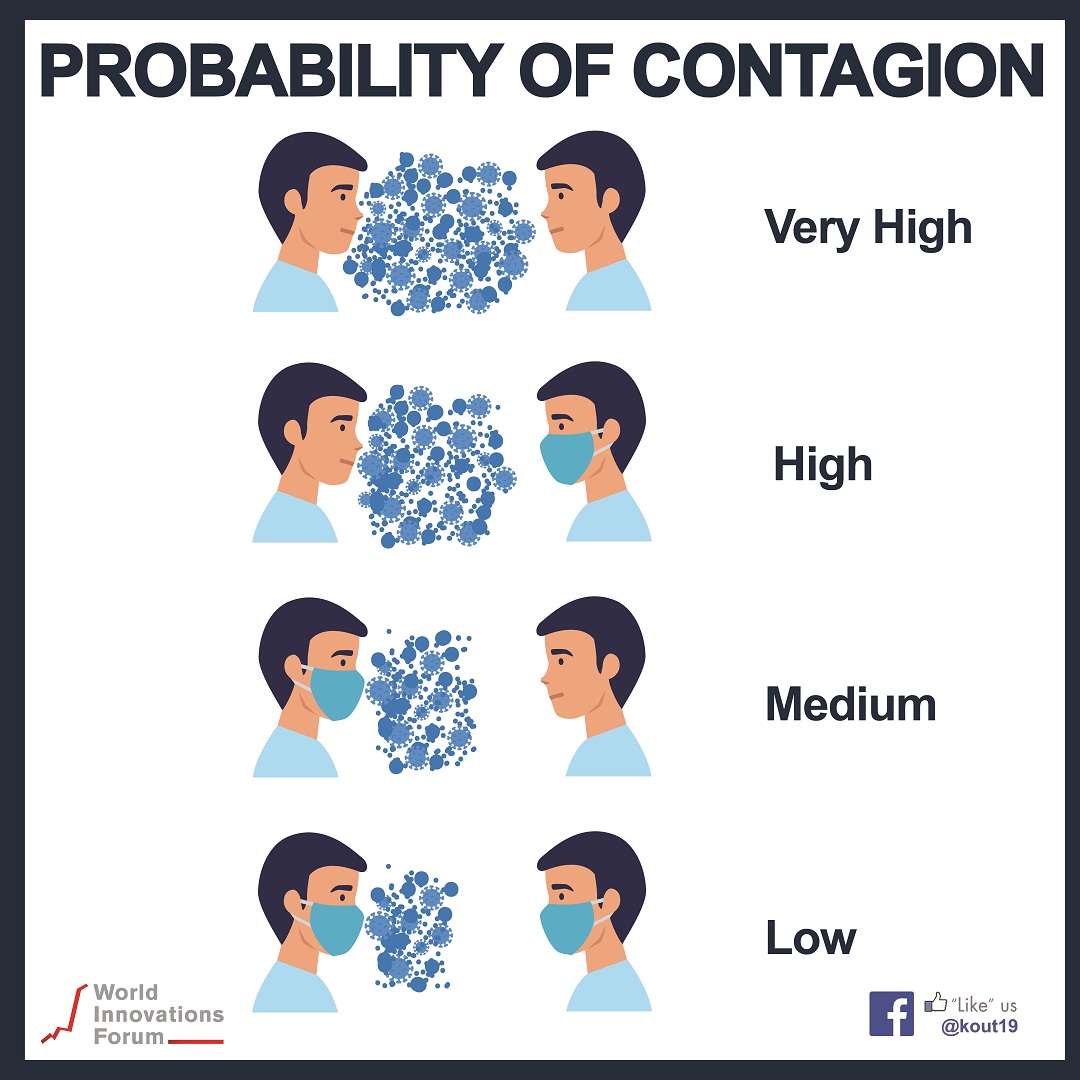
Join the campaign KnockOut-19 by wearing a mask, give our Facebook site a like and ask 3 of your friends to do the same. By doing so you will create a chain which will be faster than the virus can spread, and the Covid-19 pandemic can be knocked out in 19 weeks’ timeframe. Hence the campaign name KnockOut-19. If everyone protects everyone else by wearing a mask the virus will have less chance to spread and may well disappear. See illustration Probability of Contagion.
Here is the message we want you to pass over to your friends:
“Wear a mask – keep a distance”
No host – no virus
Tell anybody you know – we will spread faster than the virus.
And ask them to like fb.com/kout19 to count supporters.
Wear a Mask
If you don’t have a mask. Don’t worry it is not difficult to make masks. You can find more info about masks further below. Spread the word, be part of KnockOut-19! There are plenty of instructions on YouTube on how to make masks yourself. Some we have listed below. Share these with your friends. Make sure your friends wear the masks and join the initiative too. In 19 weeks Covid19 could be knocked-out. Sounds too easy to be true. Give it a try and see what happens. You can make the difference.

Be part of the KnockOut-19 challenge! Take a picture with your friends wearing the mask and send it to the World Innovation Forum. As a token of appreciation, you will receive your electronic KnockOut-19 certificate from the World Innovation Forum.
World population 7.8 Billion as of May 2020: https://www.worldometers.info/world-population/
Wearing a mask might not protect you from getting infected, but it will protect others from becoming infected. Now, imagine if everyone wears a mask, then the spread of the virus can be stopped no one will be infected. And as a result, Covid-19 is knocked out and we save many lives!
Make sure you give the KnockOut-19 campaign a like on fb.com/kout19 to count the friends numbers.
Use Hashtag #kout19
Please use it on Facebook, Instagram, LinkedIn, Twitter, email, WhatsApp, messenger – anywhere.
Thank you for caring about your friends!
Masks and Terminology
While simply covering your mouth and nose will work to reduce the probability of becoming infected. There are various types of masks, which you might be interested to know about. Masks are available in various protection levels – called FFP with a number, i.e. FFP1, FFP2 or FFP3. FFP stands for filtering face piece. The numbering defines the various protection levels. The higher the number the higher the protection level. FFP3 has the highest level of protection. The equivalent in US for FFP2 masks are the N95, which is a comparable classification of air filtration. N95 means that it filters at least 95% of airborne particles. There are N99 and N100, where the number provides you with the efficiency of the mask, meaning the minimum percentage for filtering airborne particles.
Since there is global shortage for these types of masks and they should be primarily used by healthcare workers, you can use homemade masks too. That’s why some countries are hesitant asking the public to wear masks. They are afraid they’ll run out of masks for their healthcare workers. To avoid that you can find below some links and suggestions for how to make masks at home. Or just use a scarf or bandana to cover your mouth and nose.
Instructions on how to make masks yourself – Do it yourself (DIY) masks:
https://smartairfilters.com/en/blog/best-diy-coronavirus-homemade-mask-material-covid/
https://www.instructables.com/id/DIY-Cloth-Face-Mask/
https://www.youtube.com/watch?v=iJWhZJZoAe4
https://www.youtube.com/watch?v=5IiT9cSD-Ec
https://www.youtube.com/watch?v=VUasSmReIVo
https://www.youtube.com/watch?v=uRfhuRNua_E
https://www.youtube.com/watch?v=iIuQMZ1Iw5M
https://smartairfilters.com/en/blog/best-diy-coronavirus-homemade-mask-material-covid/
https://www.instructables.com/id/DIY-Cloth-Face-Mask/
And many more instructions on YouTube!
What the World Innovations Forum asks you is: be creative and let the world know about your ideas and best practices to fight the pandemic.
Find out more about the initiative at: http://wiforum.org/innovate-fighting-pandemics/
Start participating in the conversation and join one of our dedicated groups:
The World Innovation Forum provides you a platform to share, engage, accelerate the adoption and scale your innovation with its global network of innovative minds. Be part of the innovation acceleration to fight the pandemic.
Thank you!
The World Innovation Forum
PS: Do you want to be part of the team? It is a global initiative driven by volunteers around the world. It is a growing effort. We need more volunteers to work with us on the innovation acceleration initiative of the World Innovation Forum. If you are interested to support us with your time and network, please send us an email to innovate.fighting.pandemics@wiforum.org and include a few words about yourself and what you can contribute to the initiative.
Innovate Fighting Pandemics – The power of us!
By Cafer Tosun, Jaideep Adhvaryu, Alyssa King, Axel Schultze
The Coronavirus COVID-19 has brought our life globally to a halt. While all current measures are necessary to prevent the virus from spreading to most of the population, we must accelerate innovation to get our life back to normal and save people’s life. The virus is taking human life hour by hour. Time is critical and we must put our minds together to accelerate innovation on a global scale. The World Innovation Forum has taken the leadership to bring innovative minds throughout the world together to fight the pandemics. Since the virus doesn’t care about borders, we must do the same. We are stronger together. We are not bound to borders and can win faster when we collaborate. Currently, we see uncoordinated local leadership and no globally coordinated efforts to fight the pandemics. The measures are driven by the local outbreak numbers. And even worse countries are fighting over medical supplies.
We already see many fantastic local innovations happening around the world to ease the situation and fight the pandemic. My favorite examples are when Italian engineers have turned scuba diving masks into ventilators to support hospitals. And published the how-to in a YouTube video to share with the rest of the world. Or when local breweries in Tampa switch from producing alcoholic beverages to produce hand Sanitzer, for which there is a huge demand. When South Korea has scaled testing the virus by setting up drive-thru clinics. And when car manufacturers stop production and produce medical supply to fight the Virus. The list can go on and you can be part of it!
More importantly, the innovation and out-of-box thinking is required not just in the medical sphere. We need impactful solutions and agile approaches to identify, communicate, respond, recover and repair communities in near-real time speed and at global scale while optimizing limited knowledge, resources and people.
What the World Innovations Forum asks you is: be creative and let the world know about your ideas and best practices to fight the pandemic.
Find out more about the initiative at: http://wiforum.org/innovate-fighting-pandemics/
The World Innovation Forum provides you a platform to share, engage, accelerate the adoption and scale your innovation with its global network of innovative minds. Be part of the innovation acceleration to fight the pandemic. We are stronger together!
Start participating in the conversation and join one of our dedicated groups:
Thank you!
The World Innovation Forum
PS: Do you want to be part of the team? It is a global initiative driven by volunteers around the world. It is a growing effort. We need more volunteers to work with us on the innovation acceleration initiative of the World Innovation Forum. If you are interested to support us with your time and network, please send us an email at innovate.fighting.pandemics@wiforum.org and include a few words about yourself and what you can contribute to the initiative.
2nd Global World Innovations Forum, Digital Conference
We are living in a world where Co² emission, energy consumption and major travel expenses are highly sensitive topics. We are also living in a digital age where connections are made through networks, people learn to “read” the digital body language and adapt to a digital experience. All good reasons for moving even major major conferences into the digital space.
What can you expect:
- 3-DAY EVENT – 3 1/2 hours each day, packed with keynotes, discussions, technology introductions and more
- LIVE – The whole conference is streamed life
- NETWORKING – of course networking is a key aspect of any event. Digitally it will be even better.
- PUBLIC VIEWING – Local public viewing in at least 10 countries, connect locally, experience globally
- INNOVATIVE STARTUPS – Contest winners from Africa and South East Asia present – hold your breath
- GLOBAL INVESTOR DISCUSSIONS – a network of global investors investing in fast growing businesses
- ECOSYSTEMS – some super innovation ecosystems dwarf what is created in the west
- MULTI LAYER INNOVATION – learn about the various facets of innovation, products, processes, business models and more.
June 23 – 25 we will conduct our second World Innovations Forum Digital. We expect approximately 1,000 attendees from around the world online or joining local public viewing sessions. No CO² emission, no travel, no expenses, but top speakers, great interaction, lots to learn and lots to share. And yes, networking as well – digitally. More information will be released at the beginning of March, so check back regularly for updates.
Our online conference experience
After an amazing experience in 2018, where we launched the World Innovations Forum with a global online event, we promised to continue in a two years rhythm.
Our 2018, approximately 500 attendees joined us from 41 countries: Albania, Argentina, Australia, Austria, Azerbaijan, Belgium, Brazil, Canada, Denmark, El Salvador, Germany, Ghana, Greece, Hong Kong, Hungary, India, Israel, Italy, Japan, Liechtenstein, Lithuania, Macedonia, Nepal, Netherlands, Nigeria, Mexico, Norway, Peru, Portugal, Romania, Russia, Singapore, South Korea, Sweden, Switzerland, Taiwan, Ukraine, United kingdom, United States, Uzbekistan, Vietnam.
A new dimension in high tech conferences
There was never any innovation conference on a global scale run all online over multiple days. If you would come from Hanoi, Lagos, Helsinki, Shanghai or Kathmandu to us in Zürich, it would take more than twice of your time, would cost you easily $2,000 travel alone, the cost for putting the show together would end up in a $1,000 to $5,000 entry ticket and the environmental payload would be mind boggling when 1,000 people fly in.
Of course, in a physical event, it is different when you sit in a ball room together with 1,000 people and discuss what you heard, exchange business cards, reconnect after the conference and so forth. But why not do the same digitally? We prepare the infrastructure to meet all attendees in our digital forum. There you can follow them, connect with them, chat online and re-connect after the conference.
A big Thank you to all WIForum Ambassadors, Team members, Advisors, CoWorking Spaces, Volunteers, Community Members, Country Representatives and helping hands We couldn’t be more thankful for every one of you in the big WIF family. Without your knowledge, inputs, generosity, and helping hands, we could not realize the vision of a world where prosperity is possible in all nations, through innovation and entrepreneurship – created within each country.
About doing good
Happy Birthday, World Innovations Forum! February 28, 2019 the foundation was registered with the vision to help nations become prosper through their own way of unfolding the power of innovation and entrepreneurship.
NOTE: everything that follows is through the lens of “economic development”. We are not talking about support organizations in disaster areas, humanitarian aid for health care, victims of war and so forth. Because the purpose of our organization is eradicating poverty, hunger and inequality by creating prosperity through innovation and entrepreneurship, similar to how developed nations evolved.
During our learning curve, we noticed that about US$4.7 trillion has been invested in the past 50 years in economic development. We also learned that the majority of people have not been very excited about the results. Initially, we looked at what other NGOs are doing and tried to blend in. That was a bad idea. Then we tried to find a balance between our entrepreneurial for-profit business with processes and mechanisms from non-profit organizations. It was no better. We read annual reports from similar organizations and realized that many just try very hard to be a good NGO. And a good “active” NGO is an organization that does exactly what a “giver” organization is looking for. Those giver organizations actually decide what active NGOs have to do in order to get funds. Well formulated goals, packed with keywords like “inclusion”, “climate”, “sustainability”, “equality”, “impact”, “social”, “approach”, “reporting”, “jobs created within 12 months”, “project run time 24 month” and so forth. We quickly recognized that instead of looking for funding for our unique concepts, we need to be a service organization for those who provide projects based on their research and desires of their donors. It’s a highly organized, massively structured multi-billion dollar operation. Active NGOs are super busy filing proposals for project requests, making sure they have the resources and a track record that indicates that the respective organization fulfilled the expectation of the giver organization in the past. To simplify the model, it’s a 4 tier monetary distribution structure: Donor – Distributor – Implementer – Beneficiary. This made NGOs more transparent, more efficient, more operational savvy, more trustworthy than ever before. And all have one common objective: HELPING those who are in need. This looks like a great model with little to no waste of money and the donations are really impact-focused. The first big question we had to answer: Are we willing to become an executing service organization for other NGOs. It was not exactly what we had in mind when we started. But we know, there is more to learn.
The receiver side
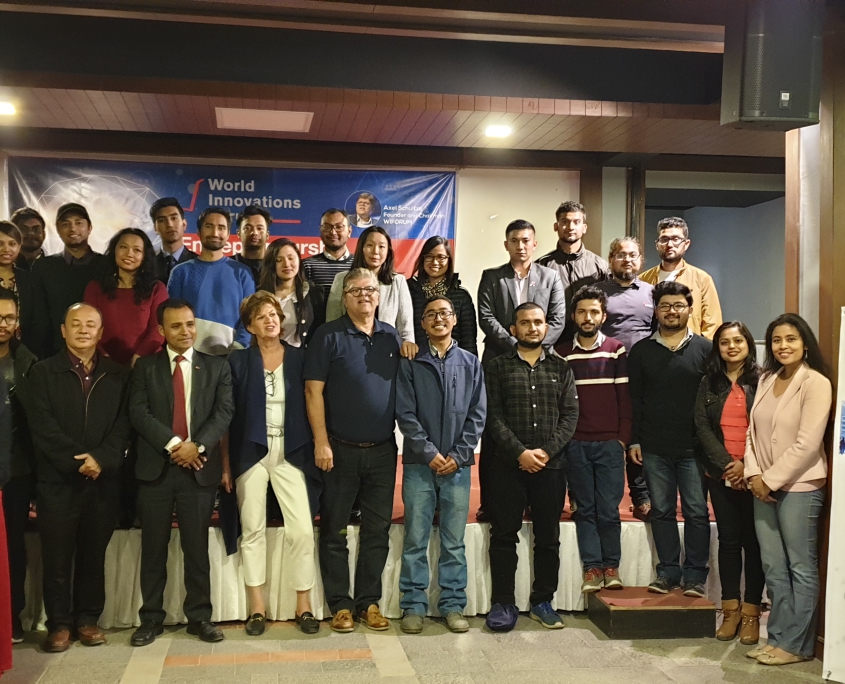 From day one till now, we decided to work on the ground. So when we visited countries and worked with young entrepreneurs or those who want to become one, we feel the heartbeat and learn how we can support them best. Amazingly, we experienced a warm welcome from entrepreneurs. We realized they rarely an opportunity to speak with experienced entrepreneurs from other countries. When we talked to local co-working spaces, accelerators and investors, we experienced a much more critical position. “What is your plan, what is your approach, what do you want to do?” our answer was always the same: “We have no plan, there is no approach, we don’t know what we will do. You will tell us how we can be helpful and we see what we can do”. We experienced an amazing transformation from a polite and professional welcome to a warm and friendly ‘love to hear your story’. Over time we heard lots of stories about support organization. To sum it up and make a narrative: “They come here, have a clear plan, based on what their sponsors tell them to do, execute “their plan”, make a lot of stirrup, then come with a team of professional photographers and camera men where everybody smiles, write reports and go back home to hunt for the next round of funding. We appreciate the help but often times it’s just too much work for us with no progress at all”. So why do you do that? we asked. Answer: We are not in a position to say no. Again, our own position was up for discussion: Are we in a position to say no and follow our own entrepreneurial instincts? So far we met and spoke with roughly 1,000 entrepreneurs and startups from a variety of countries including Nepal, Vietnam, Cambodia, Taiwan, Singapore, South Korea, Japan, Nigeria, Ghana, Uganda, Kenya, South Africa, Peru, and a few others. We met with about 50 investors and investor networks, more than 50 co-working spaces, universities other enablers and with several leading politicians in various capacities. We ran two accelerator programs and a series of entrepreneurs workshops. The feedback was inspiring and moving.
From day one till now, we decided to work on the ground. So when we visited countries and worked with young entrepreneurs or those who want to become one, we feel the heartbeat and learn how we can support them best. Amazingly, we experienced a warm welcome from entrepreneurs. We realized they rarely an opportunity to speak with experienced entrepreneurs from other countries. When we talked to local co-working spaces, accelerators and investors, we experienced a much more critical position. “What is your plan, what is your approach, what do you want to do?” our answer was always the same: “We have no plan, there is no approach, we don’t know what we will do. You will tell us how we can be helpful and we see what we can do”. We experienced an amazing transformation from a polite and professional welcome to a warm and friendly ‘love to hear your story’. Over time we heard lots of stories about support organization. To sum it up and make a narrative: “They come here, have a clear plan, based on what their sponsors tell them to do, execute “their plan”, make a lot of stirrup, then come with a team of professional photographers and camera men where everybody smiles, write reports and go back home to hunt for the next round of funding. We appreciate the help but often times it’s just too much work for us with no progress at all”. So why do you do that? we asked. Answer: We are not in a position to say no. Again, our own position was up for discussion: Are we in a position to say no and follow our own entrepreneurial instincts? So far we met and spoke with roughly 1,000 entrepreneurs and startups from a variety of countries including Nepal, Vietnam, Cambodia, Taiwan, Singapore, South Korea, Japan, Nigeria, Ghana, Uganda, Kenya, South Africa, Peru, and a few others. We met with about 50 investors and investor networks, more than 50 co-working spaces, universities other enablers and with several leading politicians in various capacities. We ran two accelerator programs and a series of entrepreneurs workshops. The feedback was inspiring and moving.
The big drivers, and why innovation is zero
 Who drives the Trillion $ aid industry?
Who drives the Trillion $ aid industry?
Governments need to balance out between public interest (tax payer money), national interest, and economic interest. So the donations are split into goals and objectives to balance the various interests, invested in countries that have a positive impact also back to the donating country. What they don’t DO is give money to those who work on the helper front. Nothing wrong with it, I believe, but good to know.
Individual Donors from average worker to ultra-wealthy billionaires. They usually can’t do anything themselves but feel the responsibility and donate from $1 to $1 billion and everything in between to help others. The most amazing aspects are 1) the gigantic amount of money that is aggregated so that we are close to actually really help everybody on earth and 2) how humans demonstrate an ability to organize themselves, their capital on a global scale almost seamlessly.
Corporate Donors from the developed world who either simply want to do good, or want to expand their business, access markets, identify new opportunities or any combination thereof. They either invest themselves or invest through those larger giver NGOs with clear goals.
Massive Giver NGOs with multi-billion $ portfolios who are extremely powerful, yet need to balance the interest of their donors, the political and geopolitical landscape, the overall trends like equality, climate etc., and make sure that the feedback from the “market” (the receiver or beneficiary) is positive and that the overhead to use the donations most effectively is tiny. They have come along way from: “most of the money is evaporating – like in the 1950’s “, to: “most of the money is actually invested in the causes and hit the space it is designated for – like today in the 2000’s”.
Operating Non-Profit Organizations with crystal clear designed requests from giver organization: what to do, where to do, how to do, how much budget is involved and the date they have to complete the task, It’s typically a 1, 2 or 4-year program.
Local Organizations, in the countries with the order to execute the plan they get from the Operating NGOs, funded by the big giver NGOs, with the donations from the individual or corporate sponsors. They have practically no flexibility and simply execute for the money they receive, in the way to program is structured. The sense for what’s needed on the ground is deteriorating and so is the true impact. The price for efficiency is in the end extremely high – non-profit or for-profit pay with the inability to innovate.
Disconnect
 The disconnect between donations and real help is growing. Over the holidays 2019/2020 we felt that we either find a radically different model or freeze the operation until somebody else is coming up with a better idea. Since no model was in sight and we experienced the deep frustration from other organizations, we decided to use our own innovation design techniques to explore alternative ways. As a first step, we disconnected ourselves from the conventional NGO space in favor of the actual beneficiaries we live for. The goal is to overcome the problematic “disconnect” from the group of people we want to help and find a modus operandi to finance the organization in a different way. With that we did a few things that should help us think on different levels:
The disconnect between donations and real help is growing. Over the holidays 2019/2020 we felt that we either find a radically different model or freeze the operation until somebody else is coming up with a better idea. Since no model was in sight and we experienced the deep frustration from other organizations, we decided to use our own innovation design techniques to explore alternative ways. As a first step, we disconnected ourselves from the conventional NGO space in favor of the actual beneficiaries we live for. The goal is to overcome the problematic “disconnect” from the group of people we want to help and find a modus operandi to finance the organization in a different way. With that we did a few things that should help us think on different levels:
1) We removed the term NGO from our entire communication.
2) We made sure that – no matter what we do – we do not lose sight of our original vision.
3) We started to use our own model of innovative thinking to develop services and business models that make sense.
4) We crafted a whole new business model and will share details once it is more mature.
5) We accepted the risk, that by disrupting ourselves, we will lose most funding opportunities.
6) We decided to build partnerships with those who believe in the concept of a collective intellect, where 1+1 is more than 2.
We will publicly share our experience here on our blog for anybody who is interested in alternative business models and operations for their economic development focused non-profit organization.
7) In no way, we are disrespecting those on whose shoulders we are about to step. The evolution from random donation into random help organizations towards a more controlled and operation was of utmost importance for aggregating the capital to help with large scale projects. Yet the economy of scale as an optimum, not a maximum.
The New Model
- We focus everything we do on the target audience, the beneficiary, in our case the entrepreneurs. We also work intensely in collaboration with an enabler, people from co-working spaces, investors, mentors, universities who support the entrepreneurship development.
- We work with partners who buy into our vision, strategy, modus operandi, and business model. We are not available as a service resource for other organizations like we would not be a white-label manufacturer if we would be an enterprise.
- The business model we created is value-based like in any economic model. We feel that impact measurement will never be seriously acceptable to measure the value one provided. We expect each service having a value that can be charged that even the poorest can pay for. And if the beneficiary is only interested in our work if it is for free, we know there is no value and that would also indicate no impact. For instance in countries where people live off of $1 a day and need all their $30 to survive, we may still ask for 3 cent for our work, also in part to provide economic thinking. Since that would not cover our cost, we are still depending on donations and sponsorship. But those are not to help provide free work but to match and add to value for the beneficiaries.
- There are other activities like awareness creation and not directly monetizable activities. For these we look for sponsors like in any industry situation. If nobody is interested in supporting the awareness creation we may still receive donations, otherwise, our awareness campaign will just be very rudimentary. And that is OK.
There are more elements we are working on but for now, that is our alternative model for innovative non-profit organizations.
Next Steps
![]() 1) We believe in innovation on all levels – also for organization models.
1) We believe in innovation on all levels – also for organization models.
2) Connecting with a like-minded organization to think together is part of our next steps.
3) After learning, entrepreneurship is the mother of all prosperity, we will continue with that very model.
4) Our focus is exclusively on our work on the ground in the countries and support from those who think alike.
5) We will look or partnerships in the spirit of SDG 17 as we believe there is no NGO big enough to solve the world’s problems alone
6) Innovation in the NGO space is not only an organizational necessity but paramount to actually fulfill our goals.
From Nov 14 to Dec 8, the founders team of the World Innovations Forum is back in Vietnam. Let us share their schedule so you can join one or the other event or arrange for a meeting in between events.
It’s our purpose to help innovative entrepreneurs to grow, get successful and create large amount of jobs in the country, driving a self propelled economy. It is our objective to help 17 countries, including Vietnam, become a “Developed Nation” before 2038.
Ho Chi Minh City
LOCATION
All below events take place at
Saigon Innovation HUB
273 Điện Biên Phủ, Phường 7, Quận 3, Hồ Chí Minh, Vietnam
Fri Nov 15, 09:15 am – 11:30 am
Inner circle meeting
For all WIForum supporter and those who are helping organize everything we do- now and in the future,
- Introducing and discussing the plan for 2020 “Seeding Innovation 2020“
- Introducing and discussing our 18 year plan until 2038 “Go2038”
“Prosperity for all nations” and how we can jointly do it with the help of the world!
Please let us know if you can come: closed - Saigon Innovation HUB
Fri Nov 15, 14:00 am …
Talent Interviews
We are interviewing candidates for our local ‘Program Manager’ position.
If you know any candidats, please send them our way.
See details here: closed
Saigon Innovation HUB
Wed Nov 20, 10:00 am – 12:00 noon
Investor training
How we envision Investors can co-invest with international investors to close bigger rounds
Investment best practices from all over the world
Finding, reviewing and investing in innovative businesses
For Angel investors, PE investors and VCs
The ICN (Innovation Capital Network) a global investors initiative
Please register here: closed
Saigon Innovation HUB
Wed Nov 20, 03:00 pm – 6:00 pm
Entrepreneurs event
Introducing the “Seeding Innovation 2020” initiative and how can help in the next 8 years to get to IPO level.
Up to 6 companies can present, maybe joining the Seeding Innovation engagement.
Event URL: https://www.meetup.com/wiforum-HCMC/events/265795315/
Presenter Application: closed
Saigon Innovation HUB
Thu Nov 21 09:00 am
Media Breakfast, (Journalists an blogger only)
World Innovations Forum introduction
Informing media representatives about our goals and activities, Seeding Innovation 2020
How a million people can help ALL nations get out of poverty
Introducing the “Innovation Paradigm” a radical new way for innovative thinking
Q+A
Register: closed
Saigon Innovation HUB
Thu Nov 21, 01:30 pm – 04:30 pm (canceled)
Innovation Paradigm Seminar
For SMEs, Corporate Managers and startup founders
Learning more about innovative thinking and disruptive business model design
A methodical approach to innovation creation
Why in the next 5 to 50 years every industry will get disrupted
Register: closed
Saigon Innovation HUB
Mon Nov 25 – Fri Nov 29
Innovation Accelerator (Flight 8)
Full week Innovation Accelerator program for founders and SME owners
Getting from good to great – from local to global – from one of many to an economic driver
So far we have stellar teams from Cambodia, Nepal, South Korea and Vietnam
Details & Apply here: http://wiforum.org/programs/sfaccel/program-application/
Saigon Innovation HUB
Hanoi
LOCATION
TBD
Mon Dec 2, 09:00 am – 11:30 am
Innovation Paradigm Seminar
For SMEs, Corporate Managers and startup founders
Learning more about innovative thinking and disruptive business model design
Why in the next 5 to 50 years every industry will get disrupted
Register: http://wiforum.org/programs/innovations-paradigm-workshops/
Wed Dec 4, 10:30 am – 12:00 pm
Innovation Ecosystem Hanoi meeting
(Incubators, co-working space, mentors universities…)
Moderating an ecosystem development process
Details & Apply here: http://wiforum.org/wiforum-ecosystem-meeting/
Select: Halon Bay Dec 4-2019
Halon Bay, Exhibition space 2nd floor
Wed Dec 4 – Dec 6
Techfest Vietnam Ha Long Bay
Vietnam’s biggest tech and innovation event
Axel Schultze will present a keynote at the opening ceremony and speak on a panel about the future of entrepreneurship in Vietnam.

As an organization, who has INNOVATION in its name, obviously we are diving very deep into the topic and getting a large variety of perspectives and insights. Innovation tightly connected to entrepreneurship. As a consequence, we asked ourselves, what can we do to bring economic development in developing countries to an all new level. A level where we can see progress in a much shorter time period. Obviously education is one of the initial needs.
Phenomenal Education Development
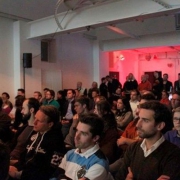 Africa, most of South East Asia and Latin America has showed phenomenal progress in education already; having 1,000 times more academic graduates than 50 years ago. There are now thousands of Universities across those continents, which created millions of well trained people – but with no equivalent job. What would a math degree do if you can’t work with it? Today there are more than a million graduates in in each of the three continents. The best they can do would be try to get to Europe or the US. Yet – that would be a devastating brain drain and remove all hopes, those nations have today. Before the inception of development aid, education was a function of having better employees to handle the jobs – but here we have better education but no jobs. We realized we needed to find out how exactly did developed countries develop.
Africa, most of South East Asia and Latin America has showed phenomenal progress in education already; having 1,000 times more academic graduates than 50 years ago. There are now thousands of Universities across those continents, which created millions of well trained people – but with no equivalent job. What would a math degree do if you can’t work with it? Today there are more than a million graduates in in each of the three continents. The best they can do would be try to get to Europe or the US. Yet – that would be a devastating brain drain and remove all hopes, those nations have today. Before the inception of development aid, education was a function of having better employees to handle the jobs – but here we have better education but no jobs. We realized we needed to find out how exactly did developed countries develop.
The Rise of Developed Countries
 In the early and mid 1800’s, Switzerland was the poorest country in Europe. Germany was a poor country, South Korea was one of the poorest countries in Asia, California was a desert and the most western farmland in the US. If not for the Gold, California would hardly be on the map. Yet the natural resources died out quickly. A similar risk the Arabian peninsula is facing. However something changed above and beyond natural resources and tourism: Innovation and entrepreneurship. When Carl Benz, Robert Bosch, Werner v. Siemens and Friedrich Krupp, crazy entrepreneurs with useless ideas, started to engineer, develop, produce, market, sell and scale their businesses, Germany became a wealthy nation. There is nothing else that propelled the German economy as much as these crazy entrepreneurs. At the same time period, Alfred Escher wanted to build a railroad in Switzerland. But since this was a low priority for the very poor Swiss population, he could not raise any capital. So he asked for foreign investment, the sheer amount he raised, required him to create a more international bank, Credit Suisse. Since he needed more talent, he created the Zürich based University, ETH, today one of the most renowned Tech Universities in the world. Did you know the jet engine was invented in France? Now you know why France is still one of the world’s leading aerospace nations. Did you know that Silicon Valley was essentially based on five entrepreneurs? Almost all developed countries started poor, had an environment where crazy entrepreneurs just could do their thing, no matter how useless and money could flow in from foreign investors. The US, Germany, Switzerland, South Korea, Japan, and all others have been based on that very principle. Thousands of years before that it was war, theft and the financing of their armies to do the very same: invent, grow, sell and come to prosperity. Since thousands of years, the nations that carried their goods in foreign countries and received investment from foreign countries rose. And there is no reason to continue that path with an ever larger number of nations. We never tried to answer the question, how can we get 3.5 Billion people out of poverty with the help from the West? We wanted to know what made the developed countries so prosperous and if we could apply that learning to eradicate poverty.
In the early and mid 1800’s, Switzerland was the poorest country in Europe. Germany was a poor country, South Korea was one of the poorest countries in Asia, California was a desert and the most western farmland in the US. If not for the Gold, California would hardly be on the map. Yet the natural resources died out quickly. A similar risk the Arabian peninsula is facing. However something changed above and beyond natural resources and tourism: Innovation and entrepreneurship. When Carl Benz, Robert Bosch, Werner v. Siemens and Friedrich Krupp, crazy entrepreneurs with useless ideas, started to engineer, develop, produce, market, sell and scale their businesses, Germany became a wealthy nation. There is nothing else that propelled the German economy as much as these crazy entrepreneurs. At the same time period, Alfred Escher wanted to build a railroad in Switzerland. But since this was a low priority for the very poor Swiss population, he could not raise any capital. So he asked for foreign investment, the sheer amount he raised, required him to create a more international bank, Credit Suisse. Since he needed more talent, he created the Zürich based University, ETH, today one of the most renowned Tech Universities in the world. Did you know the jet engine was invented in France? Now you know why France is still one of the world’s leading aerospace nations. Did you know that Silicon Valley was essentially based on five entrepreneurs? Almost all developed countries started poor, had an environment where crazy entrepreneurs just could do their thing, no matter how useless and money could flow in from foreign investors. The US, Germany, Switzerland, South Korea, Japan, and all others have been based on that very principle. Thousands of years before that it was war, theft and the financing of their armies to do the very same: invent, grow, sell and come to prosperity. Since thousands of years, the nations that carried their goods in foreign countries and received investment from foreign countries rose. And there is no reason to continue that path with an ever larger number of nations. We never tried to answer the question, how can we get 3.5 Billion people out of poverty with the help from the West? We wanted to know what made the developed countries so prosperous and if we could apply that learning to eradicate poverty.
Economic Development 4.0
 We realized that nearly all developed countries, on three different continents rose to prosperity through innovation and entrepreneurship. Moreover, in understanding that entrepreneurship is not a western ‘invention’ but a universally applicable concept, for thousands of years across all cultures. We began to look for such entrepreneurs in developing and emerging countries. And we found jar dropping entrepreneurs and their startups in Argentina, Ghana, Nigeria, Peru, Vietnam and many other countries. With those results, we decided to turn economic development towards a direction that was probably not very well understood before: innovation and entrepreneurship.
We realized that nearly all developed countries, on three different continents rose to prosperity through innovation and entrepreneurship. Moreover, in understanding that entrepreneurship is not a western ‘invention’ but a universally applicable concept, for thousands of years across all cultures. We began to look for such entrepreneurs in developing and emerging countries. And we found jar dropping entrepreneurs and their startups in Argentina, Ghana, Nigeria, Peru, Vietnam and many other countries. With those results, we decided to turn economic development towards a direction that was probably not very well understood before: innovation and entrepreneurship.
We envisioned entrepreneurial journeys from local to global enterprises in most nations. We developed unique tools like the Innovative Thinking Model, Digital Engagement Methods, and explored Next Generation Digital Stock exchanges that could make a huge difference to those entrepreneurs embarking on a catch up race with developed nations. These measures have a good chance to play a defining role in enabling fast growing innovative companies. They will develop far more environmentally friendly products, find new ways of packaging, new ways to turn deserted land back to green land, turn abundant energy like wind or solar heat into usable energy or even mechanisms to leverage those energies directly. We see entrepreneurs working on biological material and AI solutions, like in Nepal, in a way nobody ever thought about. We will not come with technology and ideas that they can execute but with ways to stimulate their ingenuity to do the impossible – and radical different things. Those new businesses can create hundreds of thousands of jobs quickly absorbing the already waiting academics. This is not an idea or concept. Again, this is exactly how developed countries emerged. And since today’s startups no longer take 30 years to rise but already after 3 years have somewhere around 50+ employees and rise to the top within 7 to 10 years, we have a good chance to turn 20 to 50 nations into prosperous developed countries by 2030. The only key task to perform is the work with governments to enable three things: Foreign Direct Investments, Infrastructure development, and Investor/Entrepreneurship friendly policies.
Economic development 4.0 is all about inspiration, education, stimulation – and letting the local entrepreneurs do what they think, what they want and what they believe is the right thing to do. If nobody wants to develop tools to structure their overwhelming city traffic, well, than there maybe no need and we may learn from the way that flow is going – very much like the flow of our blood does not need signs and stop lights ;) Economic Development 4.0 was created to prevent our developed experiences from influencing their development. You may also notice that none of the fastest growing economies these days such as China, Vietnam, Rwanda… are democracies. And we have no right at all and under no circumstances to change that. The only ones who may want to do that are the respective countries themselves – no matter what.

We are starting end of this year with “Seeding Innovation 2020” in 17 countries in Africa, Latin America and South East Asia. This is an open invitation to join us. Https://wiforum.org/join
Help from the GROUND UP
Getting 3,5 Billion people out of poverty is a daunting task. But 150 years ago most developed countries were seriously poor too. We think we found a very different way to get countries out of poverty.
We are supporting entrepreneurs in emerging countries like Vietnam, Ghana, Peru, do – what the founders in Silicon Valley, Germany, UK, South Korea did: building a strong economy and prosperity from within a country. We do not help building wells. We help local entrepreneurs what they need to build for their country – whatever it is – and it maybe wells.
How YOU can help
The WIForums project, “Prosperity for all nations” needs the help from many
1) VOLUNTEERING
Join us as volunteer or supporter
http://wiforum.org/join/volunteer/
2) SPREADING THE WORD
Join our online presences, share our content, contribute and comment
Twitter @WIForumORG – Please follow and tweet us that you joined
Quora – Lots of answers
Facebook Page – Give it a like, if you like it
Facebook Group – Join our community group
YouTube Channel – Please subscribe and check out some videos
LinkedIn Org Profil – Please follow us
Our hashtag: #WIForum
3) LEAD IN YOUR COUNTRY
We do not have ambassadors in each country
If you are interested, join us and lead the initiative in your country.
http://wiforum.org/join/ambassador/
4) MAKING INTRODUCTIONS
We are expanding into these countries
Africa: Egypt, Ghana, Kenya, Nigeria, Rwanda, South Africa, Uganda
Asia: Cambodia, Indonesia, Myanmar, Nepal, Philippines, Thailand, Vietnam
Latin America: Argentina, Bolivia, Chile, Columbia, Mexico, Peru
If you know people from the startup and innovation scene, including business angels and startup mentors – an intro would be appreciated.
5) INVESTORS
If you are interested in “Foreign Direct Investments” helping fund outstanding teams in emerging countries, check out our new project: http://wiforum.org/projects/icn/
6) Donations
And of course also we need help to help others. Introductions to CSR executives, HNI Donors or donating NGOs are always welcome.
And so forth :) Lots to do !!!!


